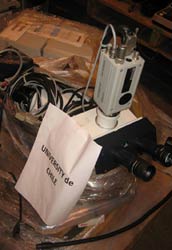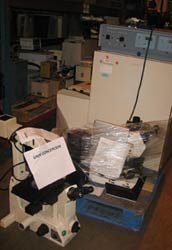NIH aids stricken Chile, Haiti with equipment loans
March/ April 2011 | Volume 10, Issue 2

Photo by Dr. James Herrington
The 84 items of equipment consists
of computers, microscopes, micro-
injectors, centrifuges, freezers and
other items.

Photo by Dr. James Herrington
The University of Concepcion is one
of the numerous Chilean university
research laboratories and facilities
receiving the equipment.

Photo courtesy of the Chilean
Embassy to the US
A truck filled with scientific equipment on
loan by NIH arrives in Chile.
Following months of hard work and diligent collaboration, five tons of scientific and laboratory equipment from the NIH arrived mid-March in Chile to assist numerous Chilean university research laboratories and facilities severely damaged by the 8.8 magnitude earthquake and resulting tsunami of February 27, 2010.
“We’re very pleased that the equipment has been delivered to the Chilean laboratories,” said Dr. Michael Gottesman, NIH Deputy Director for Intramural Research. “This is the result of months of hard work by many people and the effort will no doubt help reinvigorate the NIH’s historically robust collaborate research partnerships with scientists in Chile.”
The 84 items of equipment being loaned by the NIH consists of computers, microscopes, micro-injectors, centrifuges, freezers and others. The NIH Office of Intramural Research and Chilean intramural researchers on the NIH campus surveyed research colleagues in Chile and compiled a list of needed equipment to replace what was damaged or destroyed during the earthquake.
Fogarty worked with the Embassy of Chile in Washington to coordinate the loan, which identified the Chilean National Commission for Scientific and Technological Research (CONICYT) - the NIH counterpart institution - to receive and distribute the used laboratory and scientific equipment. Designated for support are the University Catolica del Maule, University of Concepcion, University of Chile, University of Chile-INTA (Institute of Nutrition and Food Technology) and the University of Talca.
Completing the chain of cooperation, the 10,000 tons of equipment was shipped to Chile without charge by FedEx in an arrangement coordinated between the delivery company and the Chilean Embassy in Washington, D.C.
“This is an excellent example of a bilateral relationship built not only in big announcements, but also built over a matrix of collaborative and connective pathways,” said Chilean Ambassador Arturo Fermandois.
The NIH has historically worked closely with CONICYT and has had several bilateral agreements in place to foster scientific exchange and collaboration. Dr. Pablo Moya, a Chilean postdoctoral fellow at the National Institute of Mental Health worked closely with Fogarty and the Office of Intramural Research on the loan project. “As Chilean researchers at NIH, we are happy to see this initiative reach safe dock,” said Moya. “This is an example of the importance for Chilean scientists abroad to keep networks with their country, to promote collaborative research as well as technology transfer.”
“The value of the equipment we received in support of Chilean universities goes far beyond the cost … and represents the true spirit of collaborative research and mutual understanding in the pursuit of knowledge,” said Maria Elena Boisier of CONICYT.
The equipment loan is anticipated to be permanent.
The equipment arrived in Santiago just days before the visit to Chile by President Barack Obama. The loan will help reestablish the ability of Chilean institutions to perform cutting-edge biomedical health research.
“In extraordinary circumstances scientists have to pull together,” said Fogarty Director Dr. Roger I. Glass.
In a similar effort, Haiti, which is also trying to recover from a severe earthquake last year, received an equipment loan through the efforts of Fogarty and the NIH Clinical Center. Two SonoSite ultrasound machines arrived in Haiti March 23, 2011 to be loaned to long-time NIH grantee GHESKIO, with the shipping costs paid by the Clinical Center. “We can guarantee this equipment will be put to good use,” said Dr. Jean William Pape, director of GHESKIO.
The portable ultrasound machines will be used in Haiti for cholera patients in hypovolemic shock who need vascular catheterization due to fluid loss from severe diarrhea.
To view Adobe PDF files,
download current, free accessible plug-ins from Adobe's website.